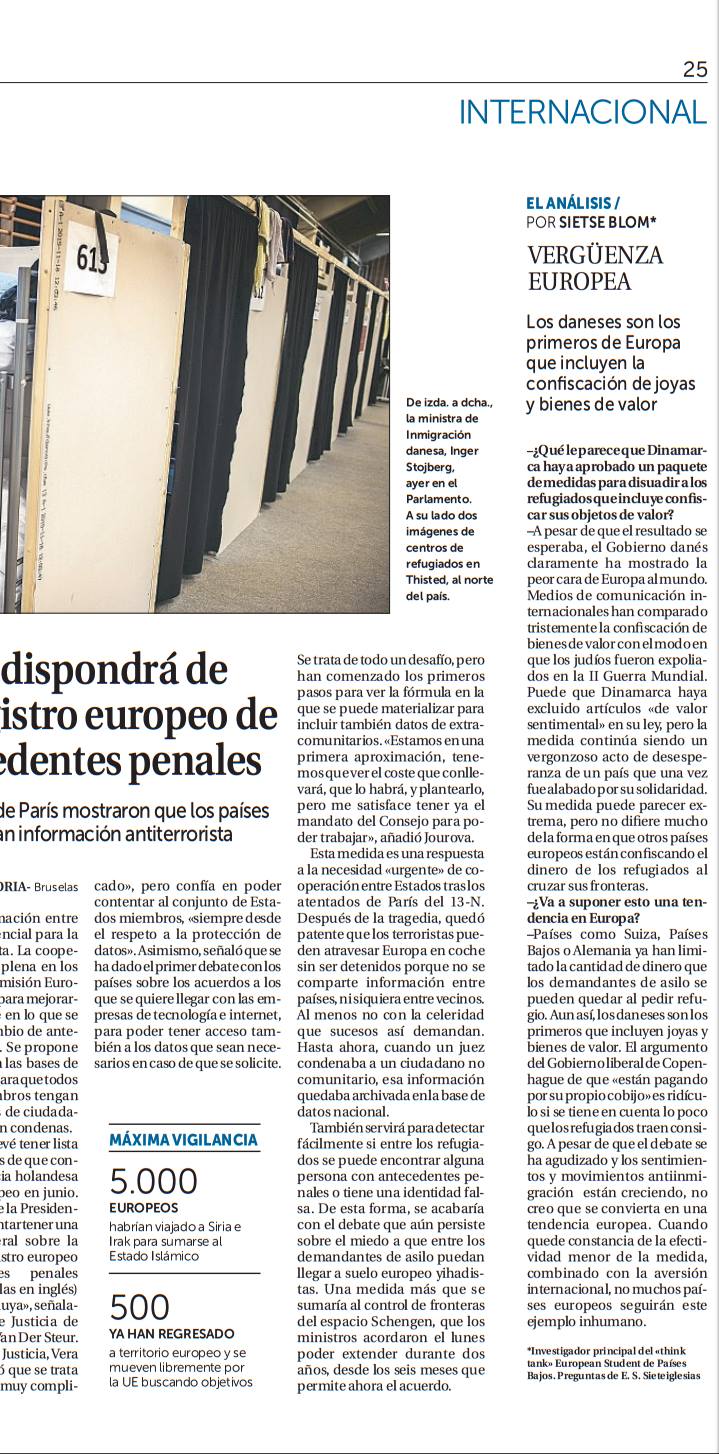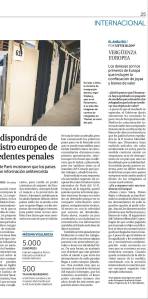
By Sietse Blom, European Student Thinktank Secretary. Sietse is following an internship at Cordaid in The Hague this year, after graduating with a BA in Political Science at the University of Amsterdam. Sietse’s Blom’s article was published in the popular Spanish newspaper La Razón. The EST Brings you the English version of his article:
 Denmark has passed a package of measures to deter refugees from seeking asylum, including confiscating valuables to pay for their stay, is this going to be a trend in the EU?
Denmark has passed a package of measures to deter refugees from seeking asylum, including confiscating valuables to pay for their stay, is this going to be a trend in the EU?
Although the outcome was expected, the Danish government truly showed its worst side to Europe and to the world. Media from all over the world poignantly compared the confiscation of valuables to the way Jews were robbed of their possessions in World War II. Denmark may have excluded items that hold ‘sentimental value’ in its law, but the measure remains a shameful act of despair from the country once broadly praised for its solidarity. Their measure might come across as extreme, but does not differ that much from the way other European countries are confiscating money from refugees entering their borders.
Countries like Switzerland, The Netherlands and also Germany already have limits to the amount of money asylum seekers may keep when applying for asylum. However, the Danish are the first to also include jewellery and other valuables. The argument the Danish government makes about this confiscation ‘paying for their own shelter’ is ridiculous when realizing how little these refugees have brought along. When imagining them fleeing a war torn country with as much as they can carry and the fact even the few possessions they still own are not considered sacred, it makes me despair. But even though the debate is sharpening and the anti-immigrant movements and sentiments are rapidly growing, I do not expect a European wide trend. When the minor effectiveness of this measure will become clear, combined with the international aversion, not that many member states will follow this inhumane example.
In terms of international law, is it fair to do that?
The biggest focus in media worldwide is on the confiscation of valuables from refugees. Although shocking, this measure in the Danish law is not the one most probable to be in opposition with international agreements. Most NGO’s and the UNHCR focus on the fact that asylum seekers are now by law only legitimised to apply for the reunification of their family after three years. Amnesty claims this violates Article 8 of the European Convention on Human Rights, in which family life is guaranteed, and some parties even say it is a violation of the Convention on the Rights of the Child.
The right to be reunited and the impact of a three year separation are things the Danish are clearly not taking into account. Moreover, who will judge what possessions hold sentimental value, the customs? And this law includes the measure that the refugees are to be searched without legal presence upon their arrival, as well as refugees already having applied for asylum. The firm accusations from NGO’s and UNHCR are a good sign of them expressing their worry.
Nevertheless, their pleas will probably not have the hoped outcome. The fact that European law comes prior in hierarchy to national law may be well-known, but in practice not that thoroughly lived by. The perfect example is Poland, where the European Union has shown its discontent about the new media laws that limit the freedom of press. Even here you see not much more than a request for more clarity about the measure and a warning to Poland.
The EU has threatened Greece with expulsion from Schengen over migration crisis. Is this a possibility? What should Greece do to protect its border?
The Greeks have been reproached a lot lately by the European Union, but also many European politicians, for not ‘protecting’ their border efficiently enough. Most of the (Syrian) refugees enter through Greece and the Greek government is not accepting all the help of other European countries or Frontex for its outer borders. Only together the EU can secure a safe passage of the refugees coming to Europe. Greece has a big marine power, but cannot face the smugglers and hundreds of thousands of refugees attempting to make the crossing without more help. Therefore other European countries should aid Greece in this registration at the borders to efficiently manage the inflow. Concerning the inner-European borders of Greece, it is comprehensible the Greeks do not impose as strict a control as the EU wants, because they cannot cope with the enormous amount of refugees remaining in their country.
Nevertheless the European pressure is increasing, so if Tsipras wants to remain in the Schengen zone, he should accept some (painful) measures of the EU. Handing over 3 billion euro’s to Turkey, a lot of help to the region or a fund of 1.8 billion to Africa (as a whole!), will not be enough to dam the flow of people fleeing their war torn countries. Even during winter, the amount of refugees did increase rather than decrease. Thus, Greece has to accept some of the measures of the EU, like stricter registration of the refugees upon arrival and a bigger role for Frontex if it wants to keep the EU’s favour and the benefits of the Schengen zone.
- Articles and Blogs
- EU Foreign Policy
- Eurocrisis
- European Integration
- Geen categorie
- ISIS
- Migration
- Uncategorized

 Is EU citizenship for sale – or for keeps? A critical analysis of the CJEU’s Golden Visa ruling.
Is EU citizenship for sale – or for keeps? A critical analysis of the CJEU’s Golden Visa ruling.  The European Union in Space: From exploration and innovation to security and autonomy
The European Union in Space: From exploration and innovation to security and autonomy  The Rise of the Right: The Threat Right-Wing Extremism Poses to Women and Feminist Efforts in Germany
The Rise of the Right: The Threat Right-Wing Extremism Poses to Women and Feminist Efforts in Germany  The silent shield – how special operations safeguard the global supply chain
The silent shield – how special operations safeguard the global supply chain 


